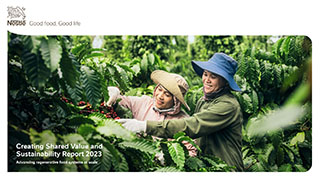Guiding toward balanced diets through responsible marketing

We have an important role to play in guiding people to adopt a balanced diet.
We believe that all our products can be part of a balanced diet that includes plenty of vegetables, fruits, pulses and whole grain, along with more indulgent food options in moderation.
We use clear labeling to communicate transparently about our ingredients and the nutritional value of our products. Through our responsible marketing practices, we aim to promote healthy lifestyles.
We advertise our products according to strict guidelines, especially when it comes to how we promote breast-milk substitutes and how we communicate to children. For instance, we do not promote infant formula for children 0-6 months in all countries as a minimum, and we restrict our marketing of certain products to children under 16 years of age.
Our commitments toward supporting conscious choices
We have set two new commitments for our confectionery and ice cream products, where local regulation allows:
Providing easy to understand information
We provide comprehensive and transparent information about ingredients and nutritional composition on our packaging.
To guide responsible consumption, we provide information and services to help people make healthier choices as part of a balanced diet.
Front-of-pack nutritional labeling
In line with regulatory requirements, we provide consumers with additional, voluntary nutritional information to help them make informed choices. Different countries and regions have their own unique nutrient profiling systems, each with distinct characteristics and purposes. These systems may vary in terms of the foods included, nutrient thresholds, and labeling requirements. As a result, we use different nutritional labeling systems.
In Australia and New Zealand, we use the Health Star Rating (HSR) system, which enables shoppers to easily compare the nutritional profiles of similar products, aiding in their decision-making process.
In several European countries, we use Nutri-Score, front-of-pack scheme developed by independent researchers and adopted by multiple European countries.
Portion guidance and portion size
How much people eat can be as important as what they eat. Launched in 2013, the Nestlé Portion Guidance initiative aims to help consumers understand what constitutes an appropriate portion of our products.
To go even further, where local regulations allow, we have set a new portion size commitment for our confectionery and ice cream products, ensuring that all multi-serve products will have clear front-of-pack portion guidance.
Guiding through nutritious recipes
We continue to provide services to provide easy-to-understand and meaningful nutrition value and portion guidance to consumers, assisting them with menu planning and providing tools to evaluate the nutritional value of consumers’ meals.
Across Latin America, our Recetas Nestlé websites inspire people to create tasty and balanced meals, with over 21 000 recipes developed by our chefs and nutritionists.
Our scientists have developed a new tool, MyMenu IQ™, that ranks the nutritional balance of meals on a scale of 0 to 100. The tool is available on 30 websites in different countries. The aim is to analyze recipes on Nestlé websites to help people improve the nutritional quality of their meals by suggesting different food combinations.
To go even further, we plan to roll out digital AI powered service platforms, including nutritious recipes, menu planning and healthy lifestyle tips.

Marketing responsibly
Adopting sound eating habits from childhood is key to a healthy life and evidence suggests that exposure to food and beverage advertising in the early stages of life can affect what and when children eat. Good nutrition is essential for children’s growth and development, and parents play a crucial role in ensuring their children have a healthy diet and develop healthy eating habits throughout their childhood – from their earliest years through to adolescence. Through education and responsible marketing practices, we believe brands can help gatekeepers make informed choices about the balanced diets children need to achieve their full potential. In 2023, we published two policies to further strengthen our responsible marketing practices.
Responsible marketing of breast-milk substitutes
We support and protect breastfeeding through rigorous compliance with our industry-leading policy and practices on the responsible marketing of breastmilk substitutes. This is why we updated in January 2023 our Policy for Implementing the WHO Code of Marketing of Breast Milk Substitutes (pdf, 5Mb). Our Policy prohibits the promotion of infant formula for babies aged 0-6 months as a minimum in all countries. Compliance with our Policy is embedded in our business practices as we continue publishing a yearly report reviewed by our board of directors.
Find out more about our commitment to supporting breastfeeding and to protecting it by continuing to implement an industry-leading policy to market breastmilk substitutes responsibly.
Responsible marketing to children
We have also taken voluntary measures on responsible marketing to children for many years. In 2023, as part of our efforts to help bring tasty and balanced diets within reach for people around the world, we strengthened our industry-leading responsible marketing practices. In particular, we placed additional restrictions on paid media advertising to prevent children under 16 from being exposed to advertising of categories such as confectionery, ice cream or sweet and savory biscuits.
Additionally, we commit not to collect any personal data and only partner with social media influencers over the age of 18. You can read more about our responsible marketing to children practices in our policy (pdf, 2Mb).
Sharing nutrition insights
Our health science podcast, Nutrition Unlocked, is sponsored by Nestlé Health Science and features special guests, including medical doctors, dieticians and researchers, who are renowned in their fields. These experts talk about some of the latest advances in nutrition knowledge. They share tips about and insights into improving nutrition and leading healthier lives, and provide a glimpse into the future of each subject. Topics are wide-ranging and so far have examined areas including food allergies, the microbiome, how nutrition affects the brain, and more.










